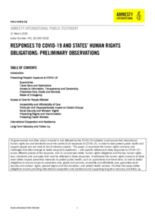All governments and other actors involved in and affected by the COVID-19 outbreak must ensure that international human rights law and standards are at the centre of all responses to COVID-19, in order to best protect public health and support people who are most at risk of adverse impacts. This paper (1) examines the human rights concerns and challenges that often emerge as states respond to epidemics – with specific reference to state responses to COVID-19 – across different phases of the response, and (2) summarizes states’ human rights obligations and the key human rights laws, standards and principles that must be reflected in these responses. It addresses the human rights concerns at stake when states impose preventive measures to protect public health, such as quarantines and travel bans; as well as states’ obligations to ensure access to preventive care, goods and services; accessible and affordable care; guarantee social security and workers’ rights; prevent stigma and discrimination; and protect health workers. It further discusses states’ obligations around providing international cooperation and assistance and supporting long-term recovery and follow up.

